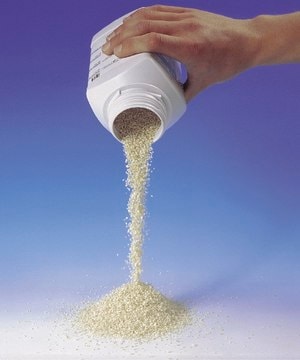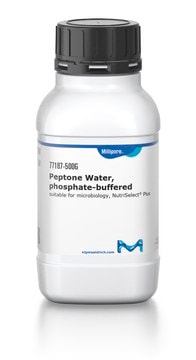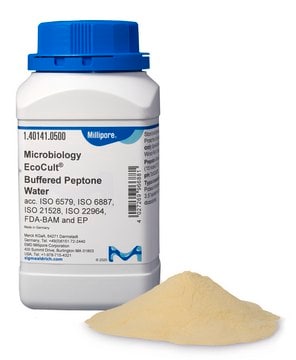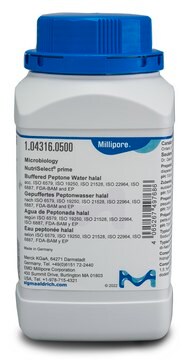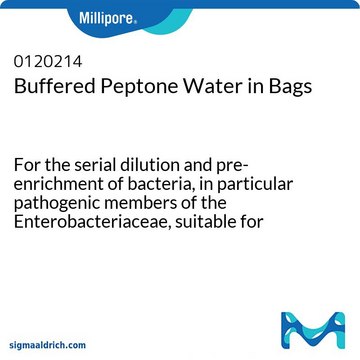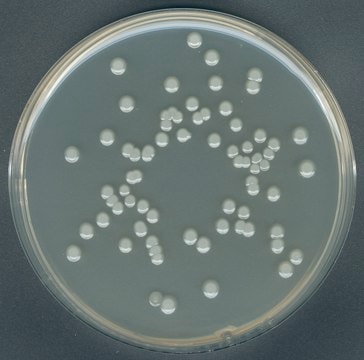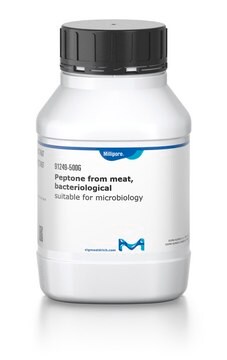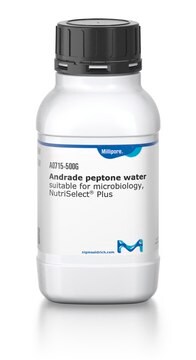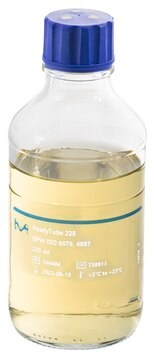70179
Peptone Water
suitable for microbiology, NutriSelect® Plus
About This Item
Produits recommandés
Stérilité
non-sterile
Niveau de qualité
Gamme de produits
BioChemika
Forme
powder
Durée de conservation
limited shelf life, expiry date on the label
Composition
peptone, 10 g/L
sodium chloride, 5 g/L
Fabricant/nom de marque
NutriSelect® Plus
Technique(s)
microbe id | specific enzyme detection: suitable
microbiological culture: suitable
pH final
7.2±0.2 (25 °C)
Application(s)
environmental
food and beverages
sample preparation
water monitoring
microbiology
Adéquation
Micrococcus spp.
nonselective for Bacillus spp.
nonselective for Candida spp.
nonselective for Escherichia coli
nonselective for Pseudomonas spp.
nonselective for Staphylococcus spp.
nonselective for Streptococcus spp.
nonselective for bacteria (General Media)
nonselective for coliforms
nonselective for enterobacteriaceae
Application
Notes préparatoires
Note de bas de page
The designations basic, plus, or prime are added to indicate the quality control level, from basic quality control to standard QC plus to prime for full regulatory compliance.
Informations légales
Code de la classe de stockage
11 - Combustible Solids
Classe de danger pour l'eau (WGK)
WGK 3
Point d'éclair (°F)
Not applicable
Point d'éclair (°C)
Not applicable
Équipement de protection individuelle
Eyeshields, Gloves, type N95 (US)
Faites votre choix parmi les versions les plus récentes :
Déjà en possession de ce produit ?
Retrouvez la documentation relative aux produits que vous avez récemment achetés dans la Bibliothèque de documents.
Les clients ont également consulté
Articles
An article concerning the detection, identification, differentiation, and cultivation of Pseudomonas species.
An article concerning the detection, identification, differentiation, and cultivation of Pseudomonas species.
Streptococci- Overview of Detection, Identification, Differentiation and Cultivation Techniques
Salmonella contamination is the second leading cause of food-borne illness worldwide. Controlling outbreaks of Salmonella is an important task for food regulators, restaurants and the food industry in general. The Salmonella family includes over 2,300 serotypes of bacteria, but two types, Salmonella enteritidis and Salmonella typhimurium, are responsible for about half of all human infections. Most outbreaks of Salmonella are traced back to dairy, poultry and meat products, but Salmonella can grow on nearly any food. Chicken, eggs and their derivative products are particularly high risk.
Notre équipe de scientifiques dispose d'une expérience dans tous les secteurs de la recherche, notamment en sciences de la vie, science des matériaux, synthèse chimique, chromatographie, analyse et dans de nombreux autres domaines..
Contacter notre Service technique